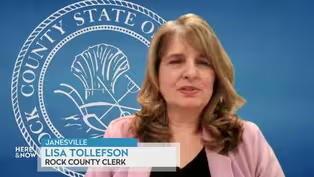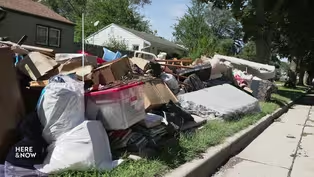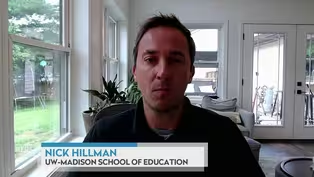Here and Now
Grant Sovern on Immigration Arrests, Detentions in Wisconsin
Clip: Season 2400 Episode 2407 | 7m 1sVideo has Closed Captions
Grant Sovern on immigration arrests in Wisconsin are more counties assist federal agents.
Community Immigration Law Center Board President and attorney Grant Sovern discusses an increase in immigration arrests and detentions in Wisconsin as more counties offer assistance to federal agents.
Problems playing video? | Closed Captioning Feedback
Problems playing video? | Closed Captioning Feedback
Here and Now is a local public television program presented by PBS Wisconsin
Here and Now
Grant Sovern on Immigration Arrests, Detentions in Wisconsin
Clip: Season 2400 Episode 2407 | 7m 1sVideo has Closed Captions
Community Immigration Law Center Board President and attorney Grant Sovern discusses an increase in immigration arrests and detentions in Wisconsin as more counties offer assistance to federal agents.
Problems playing video? | Closed Captioning Feedback
How to Watch Here and Now
Here and Now is available to stream on pbs.org and the free PBS App, available on iPhone, Apple TV, Android TV, Android smartphones, Amazon Fire TV, Amazon Fire Tablet, Roku, Samsung Smart TV, and Vizio.
Providing Support for PBS.org
Learn Moreabout PBS online sponsorshipthank you for your work.
>> Absolutely.
Thank you so much for giving us this platform to talk about our response.
>> In other news, 13 county jails in Wisconsin now cooperate with Ice, with sheriff's departments either serving warrants or identifying undocumented them for immigration officials.
And according to latest Ice data, immigration arrests have more than doubled in this state since January.
As of late June.
Ice made 445 arrests in Wisconsin.
For more on the immigration enforcement landscape here, we turn to Grant Sovern.
He's a Madison immigration attorney who helped found the Community Immigration Law Center.
And thanks very much for being here.
>> Yeah, thanks for your interest.
about the immigration now?
>> Well, I can say that in Wisconsin, we're seeing a part of what's happening across the country, which is dramatically increased efforts to find people, to detain people and to try and talk them out of being in the United States.
There are all sorts of coercive methods, but we have not seen widespread raids like you see in some big cities like Los Angeles and Chicago.
But Ice is definitely very active in trying to find people who they have any sense whatsoever might be deportable.
But the difference is they just have an idea and can allege that.
But we don't actually know that someone's undocumented or deportable until they go through immigration court.
>> So are most of these individuals criminals or facing criminal charges?
>> That's an easy question.
No.
Most of them are not criminals.
Most of them are people who are trying to figure out the immigration system.
A lot of people came in perfectly valid status over the past 4 or 5 years, maybe 6 or 700,000 people in the United States who followed all the rules.
And now this administration has changed the rules or ended their programs.
So these majority of people are folks who have been following all the rules all along, and it's the government that's changing.
>> What kind of catch 22 is that for people?
>> It's really difficult because the government seems to believe that the majority of people come to America because of all the opportunities that are here, and we acknowledge it's a great country.
A lot of people come here for jobs and opportunity, but there is a really huge percentage of people who come because they can't live where they are anymore.
And unfortunately, the approach that they're taking, the government is taking is that everybody just wants to be here and we can talk them into leaving.
>> Is there any reprieve for people who are like in the system, in the immigration system, awaiting a hearing?
We're following the prior rules.
>> If you follow the law, the answer is yes.
People who are following the rules, waiting for their day in court, filing everything the correct way.
You are waiting to be adjudicated about whether and how you can stay, or whether you are indeed deportable.
The federal government right now is taking everybody and accusing them of being criminals and saying, you must leave.
So everybody believes in the public and even the immigrants themselves is that they have no hope, whereas we have a due process system that addresses all of these things, and the government wants to circumvent that.
So it costs less and they can show more numbers faster.
Despite whether or not anyone is actually deportable.
>> What's an example of a case you've handled that stands out?
>> Well, I think right now I think about a young woman and her children who came to the US because they couldn't face the the kind of persecution that was going on where they lived, and they did not want to come to the US.
They had to leave their family.
They had to leave their community.
And they government laid out to be able to apply for asylum in the United States.
And we're seeing lots of people in this area who have valid claims or not, but are waiting to find out who are being deported before they even find out.
The good part is, there is still due process today.
And if somebody can get a lawyer and get through the system, I think of this young woman who won asylum in immigration court just in the past few weeks and is able to stay.
It's still fearful because, you know, she has the color of skin is deportable or an accent that people are going after.
But if you get through the system, you can stay and it's done legally.
>> Do attorneys like yourself learn where people deported are being sent?
>> That is one of the hardest things we're dealing with right now.
It's part of the government's effort to make the whole system more difficult is we represent people who are normally kept in Wisconsin.
But when ICE learns that they have a lawyer, they move them or they try and move them without even knowing about their lawyers status, so that family can't find them so that they can't make calls.
Generally trying to avoid due process because it slows down their efforts to reach the numbers they want.
>> Because one thing of note that we saw was that the ICE dashboard doesn't make recent removal numbers public.
>> I think that's partially because they don't know what they're doing right now.
There is a lot of disarray where people are just trying to get to the end numbers and skip over the due process, so I think they don't actually know who they're looking for or how many people they've immigration issues.
>> What's happening in courthouses or in immigration courts where Ice shows up?
>> Well, right now Ice is trying to make our communities less safe because people are afraid to go seek justice where public safety actually happens.
Our police, our sheriffs are trying to help with public safety.
Ice has a mandate to find as many people as they can, no matter their immigration status, try to arrest and detain them and deport them before they even find out, and that that is a problem in between the two.
Even though Ice is considered law enforcement, when we look at local law enforcement who care about the community, who live in our community, who are trying to make things safe, Ice has just one issue and that they're interested in, and it's even making our local law enforcement and justice systems much less safe because people are afraid to take advantage of them.
>> Are you finding that your client or the people that you work for are afraid to go out to go to?
>> Everybody is afraid right now, and this is the part the government is trying to make it so difficult.
There are maybe who are not U.S. citizens, but that goes everywhere from people who have a green card, permanent residence status, a work visa, DACA authorization, and unauthorized.
How is it that Ice is figuring out?
By looking at them walking down the street, that they might be undocumented?
They're using systems like racial profiling or the accent they have.
So any of those people who have those issues are worried whether or not you're undocumented, whether or not you have a valid immigration status, and some U.S. citizens who are worried about the current situation because the government is overextending, going beyond what the legal requirements what the legal requirements
Here & Now opening for August 22, 2025
Video has Closed Captions
Clip: S2400 Ep2407 | 1m 9s | The introduction to the August 22, 2025 episode of Here & Now. (1m 9s)
Kathryn Halvorsen on The Red Cross and Flooding in Milwaukee
Video has Closed Captions
Clip: S2400 Ep2407 | 4m 17s | Kathryn Halvorsen on Red Cross flood recovery efforts and its call for more volunteers. (4m 17s)
Lisa Tollefson on Mail-In Ballots and Elections in Wisconsin
Video has Closed Captions
Clip: S2400 Ep2407 | 5m 23s | Lisa Tollefson on Wisconsin's local officials working to maintain election security. (5m 23s)
Milwaukee Flood Recovery Efforts Continue During FEMA Visit
Video has Closed Captions
Clip: S2400 Ep2407 | 2m 27s | FEMA assessed flood damage in southeast Wisconsin to determine potential federal aid. (2m 27s)
Nick Hillman on Borrowing Limits for Federal Student Loans
Video has Closed Captions
Clip: S2400 Ep2407 | 5m 54s | Nick Hillman on the One Big Beautiful Bill Act changing borrowing rules for student loans. (5m 54s)
Providing Support for PBS.org
Learn Moreabout PBS online sponsorship
- News and Public Affairs

Top journalists deliver compelling original analysis of the hour's headlines.

- News and Public Affairs

FRONTLINE is investigative journalism that questions, explains and changes our world.












Support for PBS provided by:
Here and Now is a local public television program presented by PBS Wisconsin




